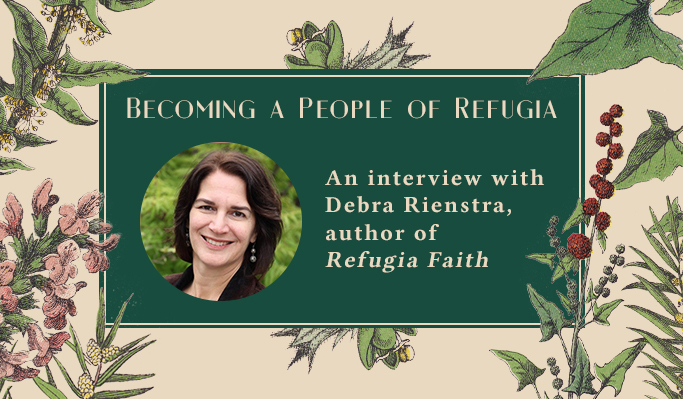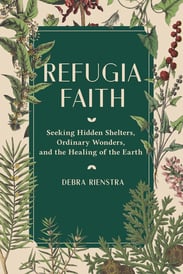
In this interview, we dive into the world of Refugia Faith with author Debra Rienstra. Discover how she seamlessly blends theology, personal narrative, and nature writing to inspire readers to become people of refugia. Join us on this journey as we explore what it means to nurture and create places of healing for all creatures on this earth.
The premise of your book is how we can become a people of refugia. Could you define refugia for those who haven’t yet read the book? And then, how have you transformed into a person of refugia on the journey to write this book?
Well, I’m trying! Probably all of us have experiences in our lives of places or groups that have sustained us in the midst of crisis. Being a person of refugia, in essence, means that you intentionally seek to nurture and create those places for other people and for the other creatures with which we share this earth. You are always asking, “What needs healing, and how can I help?” That might mean supporting the creation of local parks and wild spaces. It might mean joining a group that aids refugees in your city. It might mean working through political channels to move your city in an equitable and just way toward climate resilience.
As far as climate-related actions go, my husband and I have solar panels, electric cars, and—as I describe in the book—an ongoing native planting project with our neighbors. I’m part of a small but mighty climate group at church. I’m part of a group at my university that is (successfully!) getting sustainability concerns integrated throughout our curriculum and campus life. And of course, I’m writing and speaking all the time about the moral urgency of addressing the climate crisis together, with all our heart and creativity.
As I read your book, I was surprised by how personal it was with anecdotes before each chapter and how you wove in elements of your life, scholarly research, and faith. Could you speak about how you worked to balance these elements as you wrote and how you made it work together so beautifully?
Thank you for saying it works together beautifully. The weaving of all those elements was not easy, and I struggled with it during the writing process. But I believed it was important to create a full portrait of “what it feels like to wake up to an urgent call.” That meant combining intellectual work with emotional honesty and with accounts of my small adventures in learning and paying attention to place. So I tried to emphasize storytelling—about Michigan’s history, about plants and birds, about dune ecology, about the process of learning.
There’s quite a bit of theological analysis in the book, because reassessing our ideas about faith is a crucial endeavor right now. Even there, though, I wanted to embed theological analysis in the story of Christian faith, which is why the chapters are laid out to follow the liturgical year, from Advent to Pentecost, in a kind of narrative structure. We need to retell the Christian story faithfully, but with an accent fitting for our current days. The interstitial chapters of the book, meanwhile, are more about nature writing and feeling, because feeling is part of this process of transformation as well.
For those just discovering refugia, what brief advice would you give to encourage them to continue to learn and see what little works they can do in their lives?
Action leads to hope. Or we might say hope is in the action. I have found that knowing more and doing more actually diminish feelings of anxiety and powerlessness. It’s much worse to just brood over vague fears!
I tell people that it’s important to work on three levels if you can. First, do something small, tangible, and immediately effective—such as planting native species—in order to feel that sense of agency that keeps us going. Meanwhile, join up with other people locally in order to find a sense of community. And finally, connect with others far away—maybe through an activist organization—so that together we can move those ginormous levers of government and business. Each of those levels becomes a form of refugia, and each brings its own kind of joy, and joy and gratitude are absolutely essential for the long haul.
I like to ask most people I interview this question: What piece of media have you consumed recently that resonated with you? It can be a book, TV show, movie, or music, and why did it resonate with you?
I’m loving the new season of Ted Lasso. But as far as something related to Refugia Faith, I’m quite impressed so far with a new show on AppleTV called Extrapolations. It’s a “what-if” drama set in a future in which we haven’t done what’s necessary to mitigate climate change, and things keep getting worse. How do people survive? Who does and doesn’t? The show is created by writer/producer/director Scott Z. Burns, and the characters and story lines so far have me completely absorbed.
Click here to learn more about Refugia Faith by Debra Rienstra



